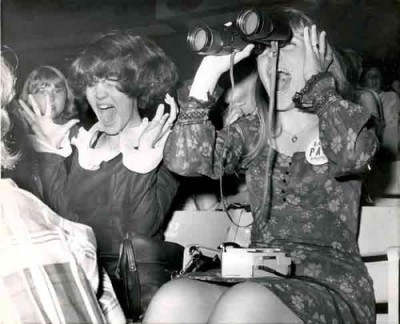Classic Live Concert Screamers (And Me)
Classic Live Concert Screamers (And Me)
by Alex Schmidt

Just about ten years ago, on June 27, 2001, I saw the first of what would become many Radiohead shows, at the Shoreline Amphitheater in San Jose. My friend May and I had fantastic seats — 3rd row, I think — and it remains one of the best concerts I’ve seen. It was so face-meltingly awesome, in fact, that I screamed at the top of my lungs every five minutes for the duration of the show.
How do I recall that detail?
Soon after, a friend gave me a recording of said show. My 21-year-old enthusiasm is audible for the entire three hours of the recording. We’re talking about a 22,000-person stadium, and while you do hear a low sustained pitch of thousands of people screaming in the background, ringing out clearly above it all is my lone, nasal shriek. Maybe it’s ’cause of how close we were to the stage.
In the pantheon of live recordings, this wasn’t a super notable concert — it’s not like you hear “Shoreline 6/27/01” played on the radio. But there are other, more well-known live recordings (some of them to the exclusion of the studio versions) that do feature memorable screamers, whistlers and squealers. Probably the most famous one is the guy who shouted “Judas” at Bob Dylan’s now legendary Manchester concert in 1966; a reporter at The Independent tracked him down a while back. (Finding him was harder than you might think.)
A notable concert screamer is the aural equivalent of the random person we end up staring at in a crowd scene, like the bystanders in the Zapruder film. At some point we have an urge to scrutinize these people who’ve become known to a wider world by pure happenstance of being there — and making a bit of noise.
In the case of the live event, these folks are worthy of some praise. There’s an element of “behave yourself” at live events, especially, though not only, if you know they’re being recorded. The success of the event depends on the audience’s cooperation; not only can a lone wacko ruin the experience for other concertgoers, but a determined one can preempt whatever creative thing a performer is trying to do. Still, the concert-screamer upends the “behave” dynamic, keeping things from getting too lemming-like. Even if they do sometimes piss off others, they add a nice sense of anarchy and randomness to the evening. That’s why their squeals (as long as they’re not sustained for the entire show) are cool on recordings — they remind you that the moment was real, and that real moments in time are not perfect.
The concert screamer is a proxy — able to express the thing that you, too, might have wanted to if you had been there or, if you were there, didn’t have the guts to. So here, for your random listening pleasure, are just a few of the notable concert screamers on record:
Bob Marley, “No Woman No Cry” — Live at the Lyceum, London, 1975
A well placed whistle during a musical interlude, heard from 4:45–4:50.
Simon & Garfunkel, “50 Ways to Leave Your Lover” — The Concert in Central Park, 1981
It’s not terribly loud, but I always anticipate the little yelp during the quiet moment from 1:48–1:49.
Eric Clapton, “Layla” — MTV Unplugged, 1992
Oh, the subversiveness of the concert screamer at an MTV Unplugged performance! Although I’m not wild about this guy’s scream at 0:57 — it actually feels a little self-conscious.
Cheap Trick, “I Want You To Want Me” — Budokan, Tokyo, 1978
This squealer manages to stand out twice amid complete insanity. ‘A’ for effort, at 1:20 and1:38.
Van Morrison, “Just Like A Woman” — Pacific High Studios, San Francisco, 1971
An excellently placed and tightly executed “whoo,” heard right after a perfect apex of the song, at 3:58.
And finally, not to place myself in the ranks of the classic screamers above, but for humor and embarrassment’s sake, a few clips of Radiohead’s Shoreline performance from 6/27/01 in San Jose, CA. My shrieks can be heard at 0:11, 0:28, 1:43, 1:50, 3:38 and 5:33.
When I first heard this recording, I felt proud — like I had been immortalized in the annals of one of the best bands of all time, part of the permanent and inescapable record of the Kid A/Amnesiac tour. In some way, I still do. But more than that, I pity the hardcore fans who own the recording — and worse, the folks who shared this live experience with me. Is it possible you’re out there reading this? Is it possible you noticed? Well, sorry ‘bout that.
Alex Schmidt is a reporter and producer based in Los Angeles. She files regularly for NPR, and irregularly for other places, about all manner of topics. You can follow her on twitter. She’d like to thank Jody Avirgan and Will Hattman for pointing her to some of the above concerts.
